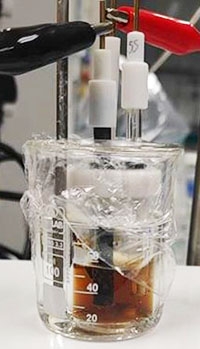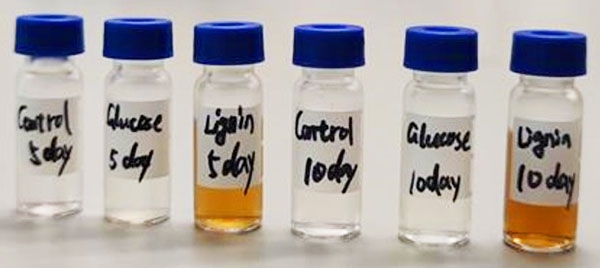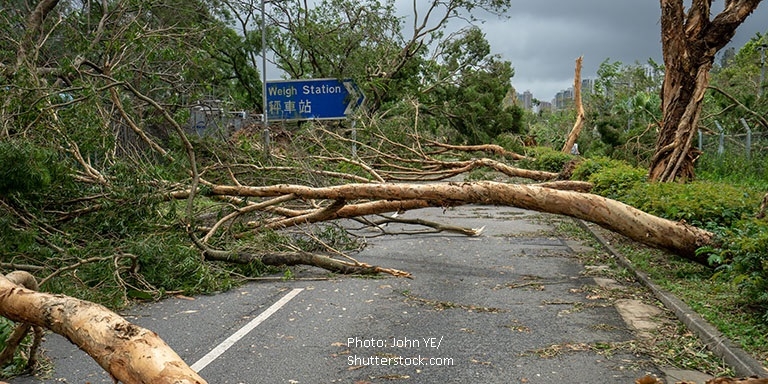
As any geologist can tell you, fossil fuels are the remains of long-gone plants and animals, many of them predating the denizens of Jurassic Park. This raises an obvious question – since we now discard huge amounts of plant and animal waste, could we not use such material to displace fossil fuels as sources of energy as well as products such as plastics and flavourants?
Dr Jason Lam, an assistant professor from School of Energy and Environment, City University of Hong Kong, certainly thinks so. His research focuses on applying electrocatalysis to transform renewable feedstock, such as biomass, into chemicals and fuels.
Specialty products

Noting the amount of wood discarded in Hong Kong, he is working on converting lignin, a key component of wood, into products such as plastics and flavourants that are normally derived from crude oil.
Before joining City University, Dr Lam was a postdoctoral fellow at Yale University in the United States, where he developed an electrochemical protocol to convert crude glycerol, a biodiesel refinery waste product, into useful building blocks for biodegradable plastics.
Dr Lam said these technologies would work best in an environment with easy access to many other chemical processors, since there are a wide variety of potential products. He added that the ongoing integration of Hong Kong into the Guangdong-Hong Kong-Macao Greater Bay Area (GBA) was likely to boost adoption of this technology.
“The increasing integration of these areas can improve the cost-effectiveness and opportunities for producing higher-end chemical products, which will incentivise the development of biomass and biorefinery waste-processing technology,” he said.
Green opportunities
Dr Lam pointed out that there has been a big expansion of green tech in Hong Kong, the GBA and China in general.
“There are an increasing number of research groups, mine included, dedicated to valorising biomass or biorefinery waste for high-value chemical or biofuel production,” he said, suggesting that biomass is the only renewable resource that can replace fossil petroleum demand and the only sustainable option for chemical and fuel production.
Biomass valorisation, also known as biorefinery, reduces fossil fuel-based greenhouse gas emissions and avoids landfill disposal. Organic waste from landfills does yield gas, which is used in Hong Kong, but wood is very difficult to degrade in a landfill because of its lignin content. Lignin is very resilient against biodegradation.

Dr Lam said the Hong Kong government financially backs green research. “In addition to some ongoing funding opportunities, such as the Environment and Conservation Fund and Innovation and Technology Fund, Hong Kong recently established the Green Tech Fund, which specialises in supporting the commercialisation of research-level technologies.”
Mainland China is also very supportive of green tech development, with a stronger emphasis on renewable energy and waste treatment. “There is no doubt green tech is already the mainstream research focus today,” he said.
Wood waste windfall
Dr Lam noted that typhoons are a frequent and unavoidable hazard in Hong Kong and occasionally create large, and literal, windfalls of wood in the form of downed trees (main picture).
“Many industrially successful wood-waste processing techs are very mature and scalable. Also, unlike food waste, which has to be processed immediately, wood or yard waste can be stored for some time to accommodate any sudden surge. Hong Kong also has a reasonably efficient yard waste-collecting network. Suppose I have to identify a bottleneck in the supply chain; I would say it is about identifying the end-users for the recycled product to enable a more streamlined waste-to-customer network.”
Hong Kong generates about 120 tonnes of lignin a day, which Dr Lam said is sufficient to feed a processing plant.
“There are several recycling options for lignin-rich solid waste such as wood waste, and most industrial-scale wood waste recycling techs are relatively primitive but practical. Some example products would be mulch, compost additive, composite board, and biochar, which are simple but highly relevant to environmental applications. So, capacity-wise, it is viable to recycle these wood wastes in Hong Kong. I think the bottleneck at this point is to identify local end-users to receive these recycled products.”
Finding flavour
He said there was also an emerging interest in high-end products. For example, vanillin – the naturally occurring chemical compound recognised as the primary aroma and taste of vanilla – has been commonly regarded as the most favourable (or flavour-able) wood-derived product. Dr Lam said that to his knowledge only one company in Norway has a successful track record in producing vanillin from wood.
“Producing vanillin from wood waste would be extremely attractive to the local wood waste processing community. Right now, vanillin is synthesised from petroleum starting materials. The wood-derived vanillin will be identical to the conventional vanillin, but its ‘biobased birth certificate’ will be significantly more attractive to fulfilling our sustainable mission and mitigating fossil resources.”
Expanding on the flavourant, he said: “One of our projects investigates the degradation of lignin to produce vanillin and other aromatic products. We practice a branch of chemistry known as electrochemistry, which is famous for its mild operating conditions and direct connection with renewable energy.
“Bio-sourced vanillin is highly valuable in the current flavour industry. The aromatic products are essential to pharmaceutical, materials, and biofuel production. So far, we have identified several interesting findings in the lab, and we are excited to increase our processing scale and system optimisation. Our goal is to transform the waste wood or yard waste materials into some ready-to-go chemicals – aka drop-in chemicals – in the most economically viable and environmentally friendly way.”
Related link
CityU School of Energy and Environment

